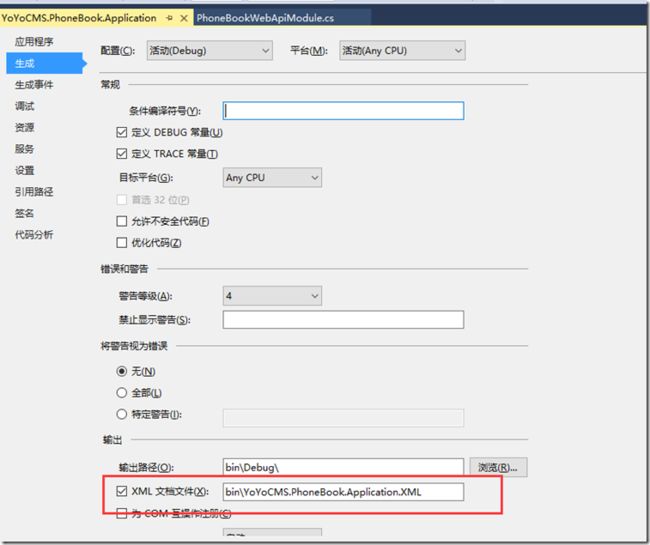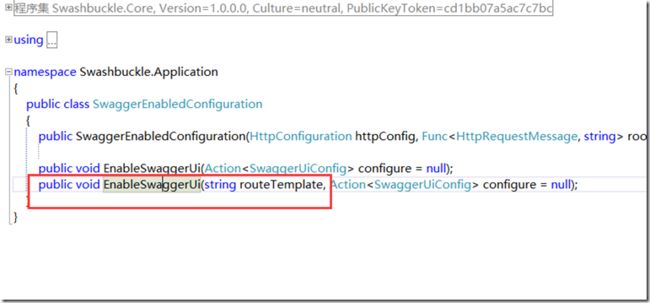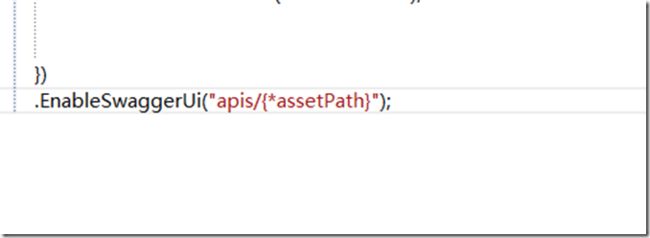使用ABP实现SwaggerUI,生成动态webapi
上一篇,我们是正式将ABP生成的代码项目,跑起来了,然后演示了下多租户的不同。那么这篇我们就来实现下SwaggerUI。
Q:SwaggerUI是干什么的呢?
A:他是一个能将我们的webapi,通过Swagger Api来生成一个交互式的文档。通过他可以对你的接口进行调式。
1、引入Swashbuckle.core
选择PhoneBook.WebApi,然后添加nuget包(当然你也可以通过命令行添加)。
输入“Swashbuckle.core”
引入到我们的项目中。
打开 项目中的“PhoneBookWebApiModule.cs”文件.
创建一个方法“ConfigureSwaggerUi();”
////// 配置SwaggerUi /// private void ConfigureSwaggerUi() { Configuration.Modules.AbpWebApi().HttpConfiguration .EnableSwagger(c => { c.SingleApiVersion("v1", "YoYoCMS.PhoneBookAPI文档"); c.ResolveConflictingActions(apiDescriptions => apiDescriptions.First()); }) .EnableSwaggerUi(); }
然后在Initialize()中对他进行调用。
2、运行项目
运行项目,打开”/swagger/ui/index”路径
得到的效果
到此呢,ABP实现SwaggerUI的功能已经算是可以了。但是我们不能就这么满足了。还不够,为什么呢。因为我们还要讲我们的注释显示出来。
这样其他开发人员看到了接口名称才能说叫做API文档嘛。
3、对API文档进行增强
大家要特别注意:
这里生成的XML文档,一定要注意是application类库中的,不是webapi类型的
是application类库、application类库、application类库
首先我们回到 方法:ConfigureSwaggerUi中,对他进行改造。
首先打开application类库的属性设置,然后在生成中找到XML文档文件,启用生成
然后再对ConfigureSwaggerUi方法进行改造
//将application层中的注释添加到SwaggerUI中 var baseDirectory = AppDomain.CurrentDomain.BaseDirectory; var commentsFileName = "Bin//YoYoCMS.PhoneBook.Application.xml"; var commentsFile = Path.Combine(baseDirectory, commentsFileName); //将注释的XML文档添加到SwaggerUI中 c.IncludeXmlComments(commentsFile);
添加以下到方法中。
然后运行项目:
咦。。。怎么没有。。注释呢。。。。
当然这一切的一切只是我们可以加注释,来现在我们把注释加上。。
然后再来运行一次项目。。。
上图我们就可以看到了。已经得到了注释信息,以后开发再也不怕哪个接口是哪个了。
4、修改访问方式
到目前为止我们访问SwaggerUI的方式都是”/swagger/ui/index/” 这样的路径访问方式。
个人感觉不是很方面我们对它进行稍微的优化下。
我们可以看到EnableSwaggerUi,F12转到定义下。
支持路由重定向,那么我们就开始改造吧。
其实就这么一句话,改造后的访问路径“/apis/index”就可以了。
看看效果。
这样操作接口就比较方便了。
5、进行将提示语言修改为中文
.EnableSwaggerUi("apis/{*assetPath}", b => { b.InjectJavaScript(); b.InjectStylesheet(); });
一个 是注入JavaScript文件,一个是输入css文件。所以如果这里可以对我们的SwaggerUI界面进行自定义修改的。
需要将js文件路径注入到SwaggerUI中。
.EnableSwaggerUi("apis/{*assetPath}", b => { //对js进行了拓展 b.InjectJavaScript(Assembly.GetExecutingAssembly(), "YoYoCMS.PhoneBook.SwaggerUi.scripts.swagger.js"); });
//YoYoCMS.PhoneBook.SwaggerUi.scripts.swagger.js是你的命名空间加上文件的路径.
很多人在这一步翻船
YoYoCMS.PhoneBook 是你的项目默认命名空间
然后接下来才是你的各种文件夹结构。。
swagger.js需要设置为嵌入的资源。
请注意你的项目结构。每一个.代表的是一个文件夹
swagger.js 也放出来。
'use strict'; /** * Translator for documentation pages. * * To enable translation you should include one of language-files in your index.html * after . * For example - * * If you wish to translate some new texsts you should do two things: * 1. Add a new phrase pair ("New Phrase": "New Translation") into your language file (for example lang/ru.js). It will be great if you add it in other language files too. * 2. Mark that text it templates this wayNew Phrase or. * The main thing here is attribute data-sw-translate. Only inner html, title-attribute and value-attribute are going to translate. * */ window.SwaggerTranslator = { _words: [], translate: function () { var $this = this; $('[data-sw-translate]').each(function () { $(this).html($this._tryTranslate($(this).html())); $(this).val($this._tryTranslate($(this).val())); $(this).attr('title', $this._tryTranslate($(this).attr('title'))); }); }, _tryTranslate: function (word) { return this._words[$.trim(word)] !== undefined ? this._words[$.trim(word)] : word; }, learn: function (wordsMap) { this._words = wordsMap; } }; /* jshint quotmark: double */ window.SwaggerTranslator.learn({ "Warning: Deprecated": "警告:已过时", "Implementation Notes": "实现备注", "Response Class": "响应类", "Status": "状态", "Parameters": "参数", "Parameter": "参数", "Value": "值", "Description": "描述", "Parameter Type": "参数类型", "Data Type": "数据类型", "Response Messages": "响应消息", "HTTP Status Code": "HTTP状态码", "Reason": "原因", "Response Model": "响应模型", "Request URL": "请求URL", "Response Body": "响应体", "Response Code": "响应码", "Response Headers": "响应头", "Hide Response": "隐藏响应", "Headers": "头", "Try it out!": "试一下!", "Show/Hide": "显示/隐藏", "List Operations": "显示操作", "Expand Operations": "展开操作", "Raw": "原始", "can't parse JSON. Raw result": "无法解析JSON. 原始结果", "Model Schema": "模型架构", "Model": "模型", "apply": "应用", "Username": "用户名", "Password": "密码", "Terms of service": "服务条款", "Created by": "创建者", "See more at": "查看更多:", "Contact the developer": "联系开发者", "api version": "api版本", "Response Content Type": "响应Content Type", "fetching resource": "正在获取资源", "fetching resource list": "正在获取资源列表", "Explore": "浏览", "Show Swagger Petstore Example Apis": "显示 Swagger Petstore 示例 Apis", "Can't read from server. It may not have the appropriate access-control-origin settings.": "无法从服务器读取。可能没有正确设置access-control-origin。", "Please specify the protocol for": "请指定协议:", "Can't read swagger JSON from": "无法读取swagger JSON于", "Finished Loading Resource Information. Rendering Swagger UI": "已加载资源信息。正在渲染Swagger UI", "Unable to read api": "无法读取api", "from path": "从路径", "server returned": "服务器返回" }); $(function () { window.SwaggerTranslator.translate(); });
6、最终运行的效果
SwaggerUI在生产环境的隐忧
有小伙伴在群里问SwaggerUI这么强大,到了生产环境是不是要手动屏蔽?
刚刚经过我的实际测试发现无须担忧这个问题。
当我们把项目发布到IIS后。
再次打开SwaggerUI
就会发现报500错误,所以这个隐忧看看不用考虑了
转载地址:http://www.cnblogs.com/wer-ltm/p/5776024.html



![W03[IU_F_41WH6U9QZ7]J`H W03[IU_F_41WH6U9QZ7]J`H](http://img.e-com-net.com/image/info8/49d6f29c96a3488fb6feed48c8c73d66.jpg)



![CRC36P@9S3V{}Y]7TEQ]]70 使用ABP实现SwaggerUI,生成动态webapi_第7张图片](http://img.e-com-net.com/image/info8/e33a9ef34c3445f4a75f54af17b81952.jpg)












